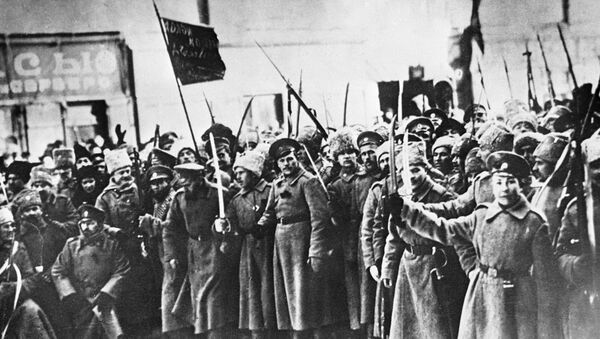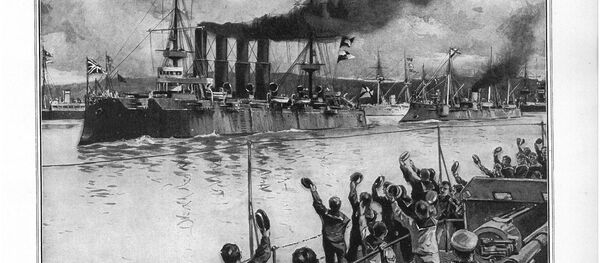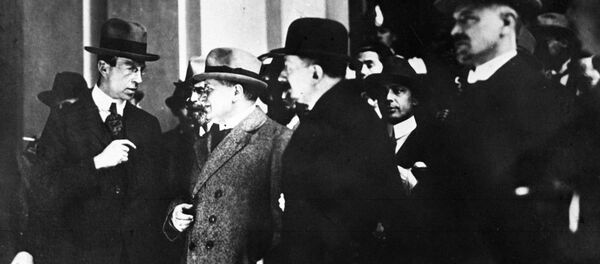Nikolai Gorshkov — Others saw it as a threat to the Allied war effort, and to the established world order – depending on the social and political affiliations of the commentators.
The Revolution started with the overthrow of Russia's antiquated absolute monarchy in February-March 1917 and morphed into a Bolshevik power grab in October-November 1917. Between these two upheavals lay the greatest promise to mankind since the French Revolution, as William Edgar Williams, the British Railway Clerks Association President, told delegates at their 1917 conference. Indeed, the Declaration proclaimed by the new government of Russia took the cause Liberte, Egalite, Fraternite to a new level.
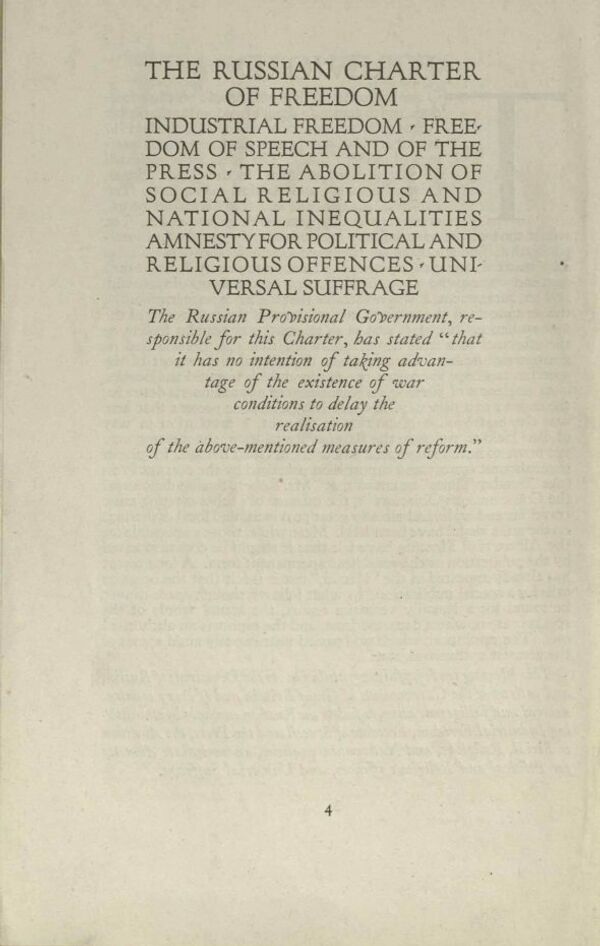
Dual Power
The February Revolution took place on 8-12 March 1917 (23-27 February 1917 according to the Russian calendar of the time). It grew out of a wave of strikes and mass street protests in the then capital Petrograd (St. Petersburg) against the unbearable deprivations of the war and the excesses of the autocratic tsarist regime. Disobeying the orders to help police disperse the protestors, soldiers stationed in Petrograd mutinied and switched sides. By March, 12 the capital was in control of the revolutionaries and on 15 March Tsar Nicholas II was forced to abdicate.
In the wake of the abdication, two institutions shared what became known as "dual power" — the unelected Provisional Government appointed by the old parliament, the Duma, and the socialist Petrograd Soviet (Council of elected Workers and Soldiers Delegates).
And just like how "dual power" split Russia, the Russian Revolution polarized British public opinion.
Shortly after the abdication of the Tsar, ten thousand people gathered at Royal Albert Hall "to congratulate the Russian people on their freedom, and to demand a similar freedom for the people of this country," according to the official report on the event.
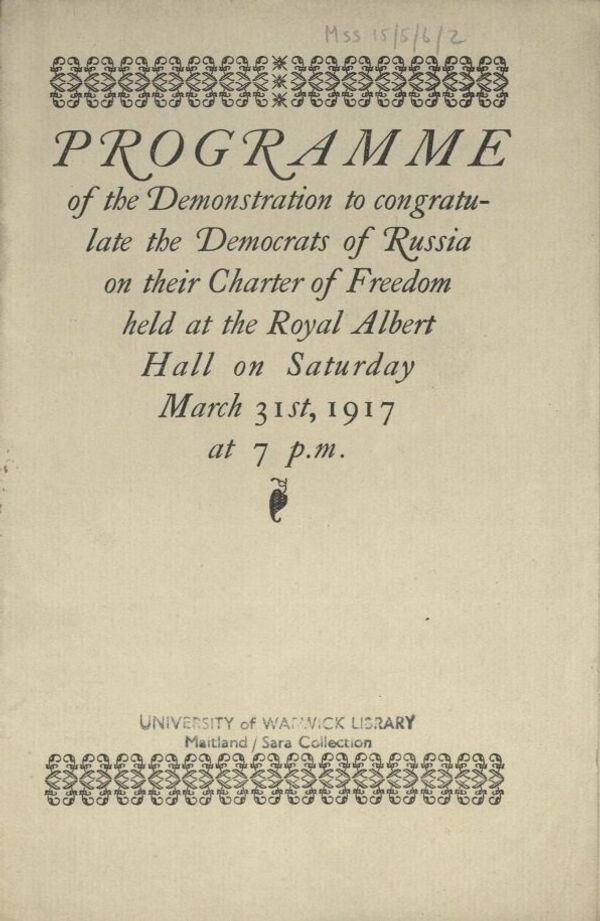
A further "five thousand people were turned disappointed from the doors."
Chair of the meeting, George Lansbury, who went on to become the leader of the Labour Party in 1930's, called the Russian Revolution "the greatest historical event, because those of us who have been in the Labour and Socialist movement have at times imagined that if there was one country in the world that would always be backward it was Russia. Yet here, in the midst of a tremendous war, a Russian revolution which thousands of men and women in the last fifty or sixty years have given their lives to make has been brought to a successful issue."
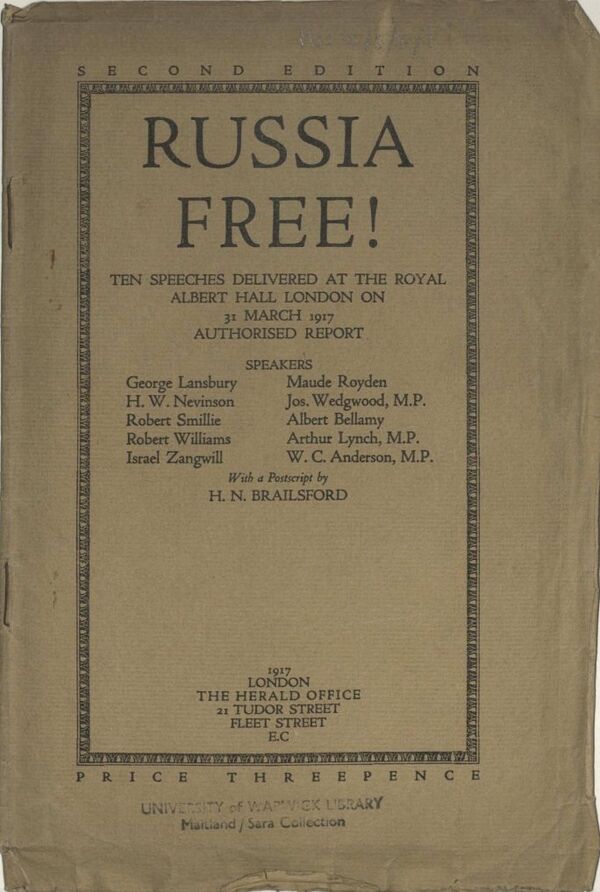
Russia had indeed been seen in the West as a symbol of tyranny, "a fly in the ointment" of the Entente Cordiale of the "great democracies" of Britain and France, as one speaker put it.
England was ashamed of such a backward ally in her fight against the equally obscurantist Central Powers, said another. Yet, criticism of the country that tied up a lot of Germanic might away from the Western front could land the British Left in hot water, as experienced by Robert Smillie, president of the Miners' Federation of Great Britain and of the National Council Against Conscription (after 1917 the National Council for Civil Liberties): "A few weeks ago I ventured to express my regret that our people were fighting side by side with the Russian Army for the alleged freedom of small nations, while its men and women were being sent to prison for political offences. I was told that I had brought myself dangerously near a breach of the Defence of the Realm— (laughter) — and now the Government and the politicians by congratulating Russia are proving that I was right then."
Unalloyd George
The jubilation about the end of oppression in Russia was tinged with worries about the way the Great British democracy was going.
Author Israel Zangwill, a scion of a family of Jewish immigrants from the Russian Empire, painted a scathing caricature of war-time Britain.
"By the irony of history just as Russia has gained a constitution we have lost ours. (Loud cheering.) And instead of our having the right to be ashamed of Russia, it is Russia that may soon be ashamed of us…"
"What was worst in Russia was wafted over here: the Censorship, the passport, the police documentation, the prohibited zone, the ‘oblawa,’ or drive of human beings, the persecution of religious sects — for what else is the conscription of Quakers?— the ‘okhrana"’or secret police, the ‘agent provocateur,’ the farcical trial; even, on a mild scale, the pogrom. If Russia has turned into England, England has turned into Russia. If we have no Grand Dukes we have Lord Northcliffe [owner of The Times and Daily Mail newspapers – ed.], and if we have no royal autocrat we have Lloyd George, who has ignored the House of Commons and given the Cabinet the knock-out blow [by restricting all decision making to a five-men War Cabinet – ed.]. …Now, Mr. Lloyd George, tempered by the constitution, may be all very well, but unalloyed George — (laughter) — is a national danger. And, therefore, we hope that the first effect of the Russian Revolution will be to give us back our Duma. To the new Russia we look for the redemption of the new England."
This unjust suffering, Smillie said was not confined to conscientious objectors who have been court-martialed: Britain too had "political offenders.”
Easter Rising
"There are to-night hundreds of young Englishmen in gaol for their beliefs; there are to-night thousands of young men in India in gaol. The people of India, the people of Ireland, the people of Ceylon, ask that we who claim to be the leaders of democracy in the world shall put our principles into practice at home. We have no right to call ourselves a free nation so long as this lasts. The time has come when we should follow the glorious example of Russia and set those men free."
George Lansbury and other speakers compared the events of March 1917 in Petrograd with the Easter Rising in Dublin a year earlier, paying tribute to James Connolly, the Irish socialist who had been executed for his leading role in the insurrection.
"We British people have got to clear that Irish question up, because until we do it is not for us to celebrate other people's triumphs over reaction."
"I want to see this Russian movement impelling you and me to catch their unity, their enthusiasm, and be ready to suffer, and if needs be to die, for our faith. It is fine to cheer these other people, fine to feel you can sing about them, talk about them; a finer thing still is to follow their example," Smillie urged the audience.
Such was the enthusiasm and passion in the audience, the report on the meeting said, that it "may yet prove to have inaugurated a new era in Great Britain. In spite of the dishonest secrecy and suppression practiced by the corrupt Press (the "Sunday Times" reported that "Mr. Robert Smillie denounced the Conscientious Objectors"), the message of such a meeting must travel far and wide, and already great provincial and local gatherings on the same model have been held."
The culmination of those was the Leeds Convention held on 3 June 1917 and attended by 1,150 delegates from trades councils and unions, local Labour parties, c-operative and peace societies and May-Day committees.
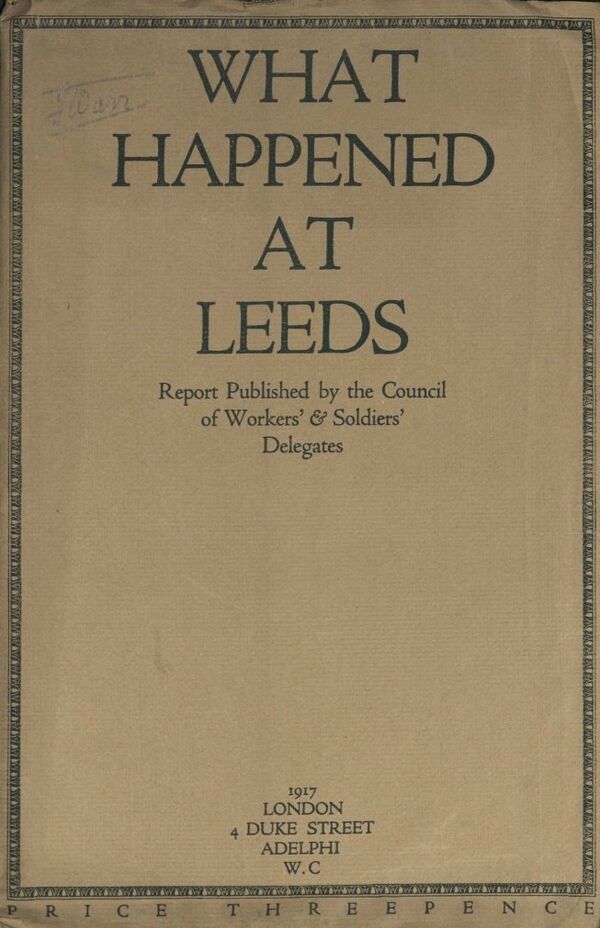
The Conference set up a Council of Workers' and Soldiers' Delegates, with the future first Labour Prime Minister J. Ramsay Macdonald among the members of its Central Committee. Taking its cue from the Russian Soviet of Workers and Soldiers Deputies, the Council set about to establish its authority across the Realm.
Was it a portend of things to come as the great English writer and philosopher G. K. Chesterton put it?
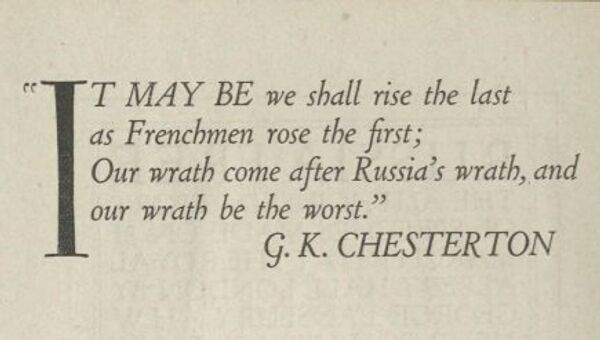
The most immediate task of the Council was to send delegates to a proposed peace conference in Stockholm for Socialist and Labour parties from all countries which could have ended the war by putting concerted pressure on the belligerent governments. Alas, just like before the war the Socialist International was in disarray as to whether support or condemn it. That the Stockholm conference never met "contributed mightily to the outcome of the Russian Revolution and the Bolsheviks' coming to power," wrote Rex A. Wade in the Slavic Review.
But this is another story, to follow shortly…
The views expressed in this article are solely those of the author and do not necessarily reflect the official position of Sputnik.

